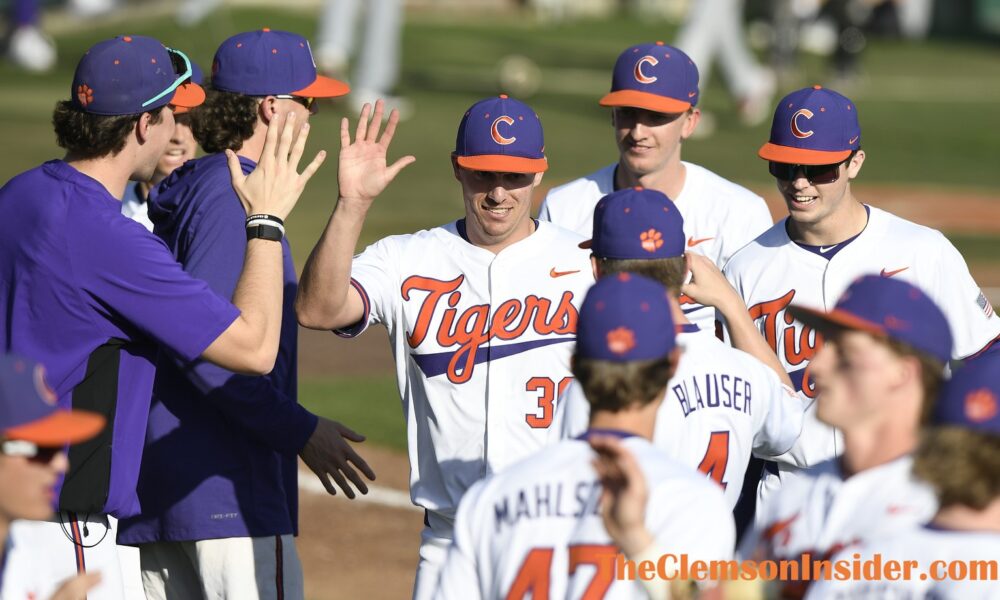Twice during Monday’s NCAA Baseball Tournament selection show, ESPN host Dari Nowkhah mentioned the quick turnaround Erik Bakich has done with the Clemson Baseball program.
After two straight years of not making the field of 64 under former coach Monte Lee, Bakich has not only won an ACC Tournament Championship, but has guided the Tigers to back-to-back top-8 national seeds, including a No. 6 national seed this year.
Clemson (41-14) will host its second straight regional under Bakich this weekend as Vanderbilt, Coast Carolina and High Point come to town to fill out the four-team field. The Tigers play High Point in Game 2 of the Clemson Regional on Friday (7 p.m., ACCN).
In his two short years in Tiger Town, Bakich’s teams have produced an 85-33 record, including a 40-20 mark in ACC play. Clemson has not had back-to-back 20-win ACC seasons since the 2005 and 2006 teams did the same.
So, Clemson’s second-year coach deserved the praise he got from Nowkhah and then some.
Now imagine what Bakich could do if he had the same advantages at Clemson that programs like Vanderbilt, Virginia and North Carolina have had for years when it comes to large endowments.
Imagine what he could do if he had a statewide scholarship program like Georgia’s HOPE Scholarship or even the advantages Florida’s State Lottery program offers baseball programs like Florida’s and Florida State’s.
These days, it’s Name, Image and Likeness that has Clemson at a disadvantage. Schools like LSU, Tennessee and Texas A&M are basically trying to buy championships, as they are throwing enough money around for baseball players to not only pay for their schooling, but also have plenty of pocket cash too.
Though Bakich has tried to get Clemson supporters on the NIL train, in hopes of raising enough money to provide full scholarships for his players, those efforts have been futile at best. Currently, the NCAA allows baseball teams 11.7 scholarships for their 27-man roster, with each player receiving a minimum of 25 percent.
Without the large endowments, state scholarships and the lack of NIL support, Clemson Baseball has been competing with one arm tied behind its back for a decade and a half. However, those days could be changing soon.
As most of you know, the NCAA and its leagues moved forward last week with a multibillion-dollar agreement to settle three pending federal antitrust cases. The NCAA will pay more than $2.7 billion in damages over 10 years to past and current athletes. According to reports, parties also agreed to a revenue-sharing plan allowing each school to share up to roughly $20 million per year with its athletes.
All Division I athletes dating back to 2016 are eligible to receive a share as part of the settlement class. In exchange, athletes cannot sue the NCAA for other potential antitrust violations and drop their complaints in three open cases — House v. NCAA, Hubbard v. NCAA and Carter v. NCAA.
Athletic directors, conference administrators and coaches are still trying to figure out what this all means for the future of collegiate athletics. But we have learned a little about what it could mean for college baseball, especially Clemson Baseball.
One of the things mentioned in the settlement was the NCAA plans to remove the limitations of scholarships, though there will be roster limits. In other words, by 2026, schools could give full scholarships to all their student-athletes if they chose to do so. The 11.7-rule will no longer exist.
This is huge news for Clemson Baseball and will allow Bakich and his staff to recruit at another level. However, there will still be some obstacles.
It doesn’t appear NIL is going anywhere, though the NCAA and the conferences will attempt to figure out how all this will work with the collectives and such. So, some schools, which we are already seeing, will still be out there trying to outbid another school for a player’s services.
The NCAA still has a long way to go to figure everything out, but at least it appears Clemson Baseball will not have one arm tied behind its back anymore.
Clemson Baseball will finally have a solution to a problem it has not been able to solve since 2010, which by the way was the last time the Tigers made it to Omaha for the College World Series.
